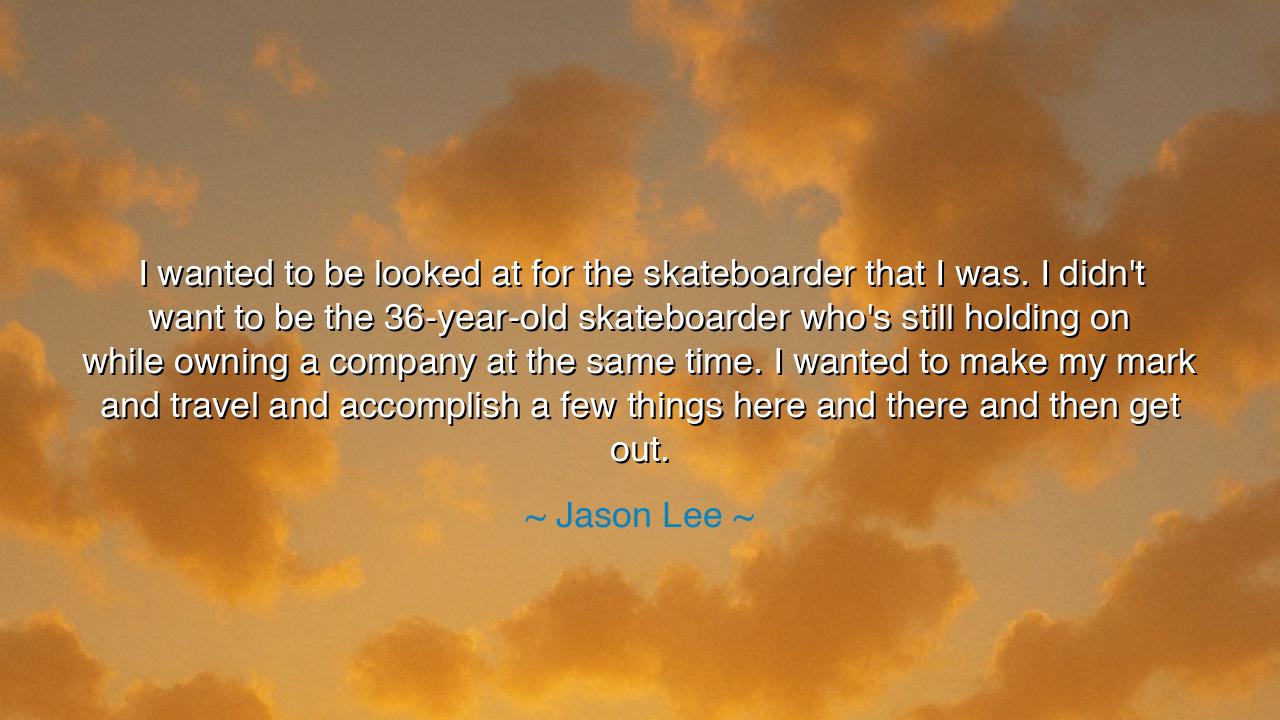
I wanted to be looked at for the skateboarder that I was. I
I wanted to be looked at for the skateboarder that I was. I didn't want to be the 36-year-old skateboarder who's still holding on while owning a company at the same time. I wanted to make my mark and travel and accomplish a few things here and there and then get out.






“I wanted to be looked at for the skateboarder that I was. I didn't want to be the 36-year-old skateboarder who's still holding on while owning a company at the same time. I wanted to make my mark and travel and accomplish a few things here and there and then get out.” Thus spoke Jason Lee, not only of skateboarding, but of the fleeting nature of glory, the burden of time, and the yearning of the soul to be seen for its truest self. His words are not confined to ramps and rails, but echo the wisdom of the ancients: that a man must know his season, embrace it with fire, and release it with dignity before the world turns his triumph into parody.
When Jason Lee speaks of being looked at for the skateboarder that I was, he speaks of the longing for recognition not as a relic, but as a force alive in its proper moment. He did not wish to cling to youth like a man clutching water in his hands, watching it slip away while pretending it remains. No—he sought to step forth, to make his mark, to carve his name into the stone of memory while his flame still burned. He understood that to hold on too long is to invite the world’s pity, but to let go at the right time is to preserve the world’s awe.
History reveals this lesson in many forms. Consider Alexander the Great, who by the age of thirty had conquered much of the known world. He did not wait for decline; he sought glory swiftly, burned brightly, and though his end came young, his legacy became eternal. Or think of the great athletes of Olympia, who, knowing the limits of their bodies, left the games once their peak had passed, choosing to be remembered as champions rather than as shadows of themselves. Jason Lee, in his own way, followed the same path: better to be remembered as the bold skateboarder who changed the game, than as one who lingered past his time, clutching at a crown already lost.
His words also reveal a deeper truth about identity. He did not want his name blurred beneath the weight of business and age, reduced to a figure who had once skated but was now defined by something else. He longed for clarity of legacy—that when people thought of Jason Lee, they thought of the skater, the artist of movement and risk, not merely the businessman who carried the memory of what once was. For what is a man’s life but the story told of him? And what shame is there if that story becomes muddled, no longer echoing with the purity of what he truly gave to the world?
Yet his lesson is not despair, but wisdom. He teaches that there is a time for striving and a time for letting go, a time for shining and a time for stepping aside. To know when to depart is as noble as to know when to begin. Those who linger too long, clinging to past glories, risk turning their legacy into mockery. But those who bow out with grace leave behind a flame that no years can extinguish.
So too in our own lives we must learn this rhythm. Strive while your season calls; pour your energy into your craft, your art, your work, and let the world see the best of what you are. But when the time comes to step back, do not cling. Embrace the new chapters, the fresh paths that life offers, and let your legacy speak on its own. Be remembered for the mark you made, not for the fear with which you clutched it after its time had passed.
Practical wisdom flows from these words: pursue your passion with intensity, but do not let it define you forever. Recognize the signs of transition; when a door closes, step boldly through the next one. If you are an artist, create while your vision burns; if you are a builder, build while your hands are strong. But when the season ends, walk away with dignity, carrying the pride of what you accomplished. This is how your memory remains untarnished, your legacy pure.
Thus let Jason Lee’s wisdom echo in you: make your mark, embrace your season, and know when to step aside. For to live clinging is to fade, but to live with rhythm is to be eternal. Would you like me to adapt this into a spoken script, marked with pauses and crescendos, so that it feels like a sage’s teaching recited aloud?






AAdministratorAdministrator
Welcome, honored guests. Please leave a comment, we will respond soon